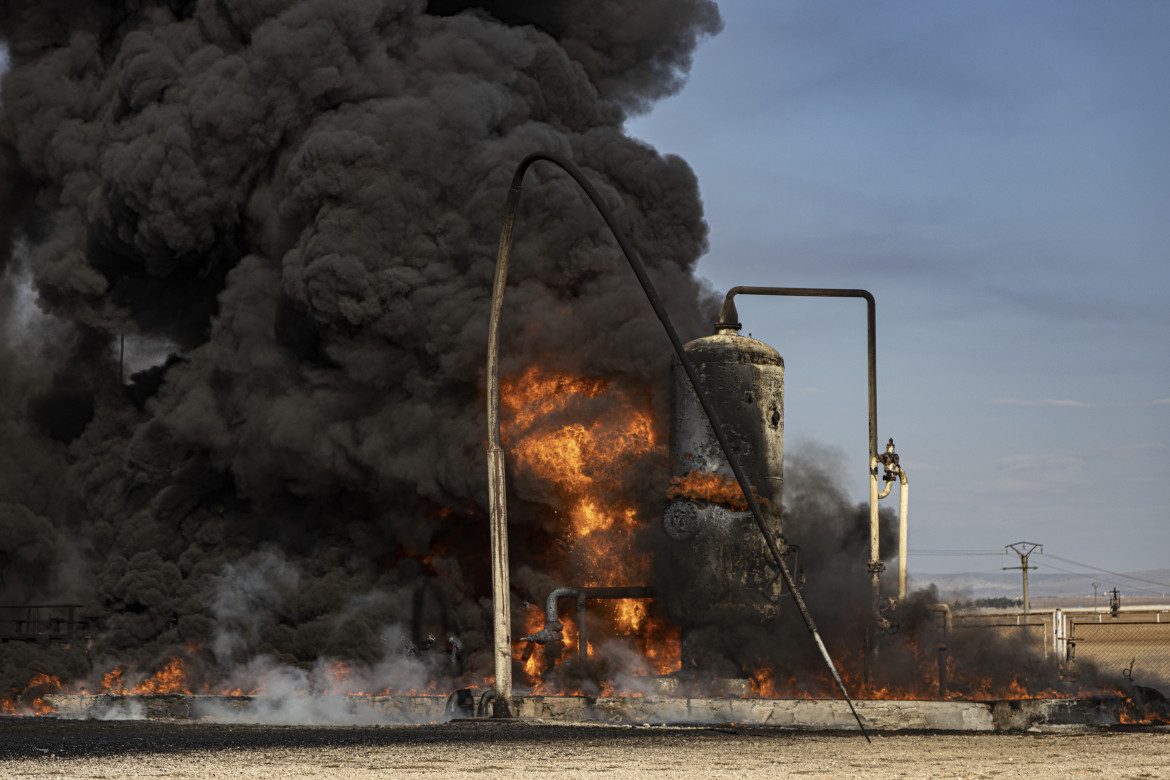Interview. We spoke with Ronahî Tolhildan, a fighter with the Kurdish women's defense units, YPJ, stationed in Kobane.
‘Turkey is not only weakening the structures of the SDF that are holding ISIS members in custody, but is giving concrete support to the Islamic State.’

written by Chiara Cruciati
November 28, 2022
Villages, grain silos, refineries and oil wells: small installations that are propping up northeastern Syria, extracting incomparably minuscule wealth compared to the neighboring energy giants. However, five days after the launch of Turkey’s Operation Claw-Sword, it is apparent that these are its targets, together with civilian infrastructure and population centers, from the east to the west of Rojava.
While the Syrian Democratic Forces (SDF) commemorate the eight fighters killed Wednesday in the Turkish raid on the Al-Hol camp (a tent camp where 60,000 ISIS militiamen and their families are detained), there were some signs of protest from Washington, which had been inscrutable so far: Recent air strikes in Syria directly threatened the safety of U.S. personnel who are working in Syria with local partners to defeat ISIS and maintain custody of more than 10,000 ISIS detainees.” As a result, the U.S. called for “immediate de-escalation.”
We spoke about these developments with Ronahî Tolhildan, a fighter with the Kurdish women’s defense units, YPJ, stationed in Kobane.
How high is the risk of increased ISIS activity in Rojava due to Turkish raids? Or of new breakouts, like the one attempted in January in Hasakah?
Every attack on the Northeast Syria Autonomous Administration is strengthening ISIS. Turkey is not only weakening the structures of the SDF that are holding ISIS members in custody, but is giving concrete support to the Islamic State in the form of information, resources, coordinated attacks. In early 2022, during the attempted breakout from Hasakah prison, Turkey targeted reinforcements who were on their way there to stop it. The occupied city of Afrin is now in the hands of Hayat Tahrir al-Sham [the Al-Qaedist group formerly known as the Al-Nusra Front] and on Thursday, jihadist mercenaries approached the cities of Manbij and Raqqa. The jihadist and Turkish attacks should be seen as part of the same attack against the revolution and its values. The risk of a return of ISIS is not confined to these places: Europe is at risk, the world is at risk, because of it.
What is the Turkish strategy? To quickly occupy communities on the Turkish-Syrian border to close the northern corridor or pressure the SDF and civilians to flee, undermining the revolution from within?
The Turks’ military strategy has multiple parts. First, they try to attack society by destroying people’s resistance, demoralizing them and disconnecting them from the Autonomous Administration. Then they strengthen ISIS sleeper cells, as we saw yesterday with the bombs dropped on the security forces at Al-Hol camp. Finally, as soon as possible, Turkey will invade overland and attempt to close the land corridor at the border. In the long run, Islamist groups are expected to establish themselves in the occupied regions, as happened in Afrin, Serêkaniyê and Gire Spî. And it seems that the U.S. wants to reach a “joint solution” with Turkey. This would lead to a new Afghanistan.
So a land-based invasion is possible.
Certainly. Erdogan has already done that in 2018 in Afrin and in 2019 in Serêkaniyê and Gire Spî. Neither the U.S. nor Russia intervened. The first target is likely to be Kobane, a symbol of popular resistance to ISIS. Much of the shelling is already targeting this town and district. In this way, Turkey would link up the occupied cities, Azaz, Serêkaniyê and Gîre Spî.
Were you warned by the United States of the attack Turkey was about to launch?
The U.S. had warned its citizens a few days before. But this was an action more aimed at spreading panic than warning of danger.
The current war is also a psychological war: a constant military pressure which, together with the de facto embargo, steals time and energy away from the revolution, resources that could be used to improve on the already major successes reached.
This kind of low-intensity warfare affects people. The Turkish state is targeting infrastructure and civilians in order to terrorize people and push them to flee. But the self-defense units and the people are standing side by side and will defend the liberated areas. We have been subject to multiple Turkish attacks for years, but the resistance has never been defeated. We will not leave our positions. The revolution has been ten years in the making and has achieved a great deal. Too often the achievements of the people are threatened and destroyed. Peace in northeastern Syria is necessary both for those who live here and also for the whole Middle East, because it is seen by the whole world as a model of women’s liberation, self-determination and cultural diversity.
Do you have any kind of coordination with the Syrian army for the defense of the northeast?
There is no cooperation with the Syrian army.
Chiara Cruciati
Originally published in Italian on November 25, 2022https://ilmanifesto.it/le-bombe-turche-hanno-ridato-forza-ai-jihadisti-in-siria
No comments:
Post a Comment